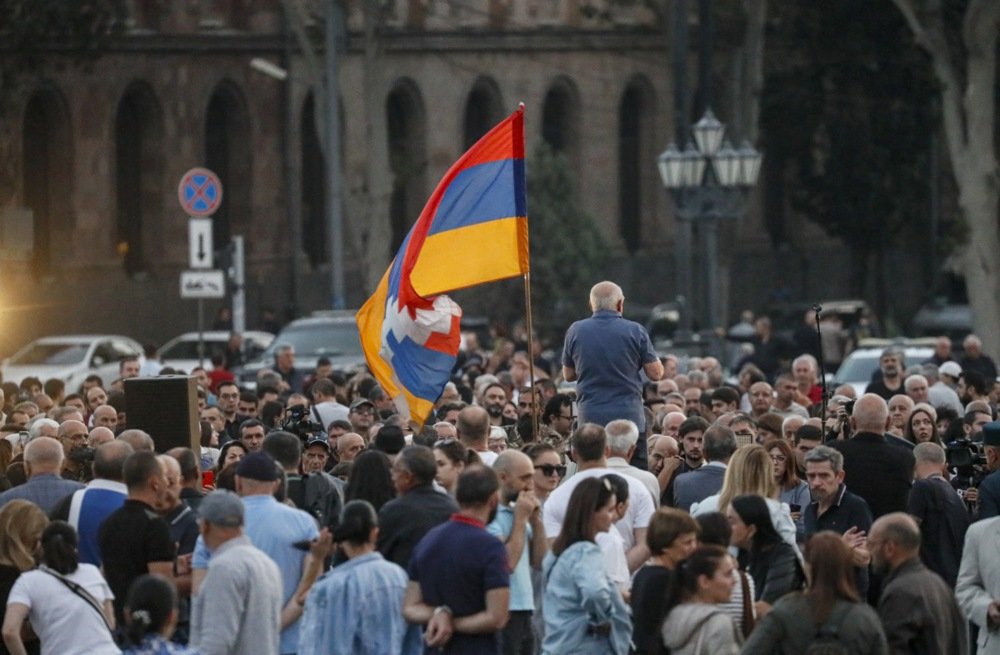In the South Caucasus, a region where more than 30,000 people have died and 1.3 million have become refugees in over 30 years of interethnic warfare, the United States has a historic chance to wage peace — and win national security and economic benefits — by persuading Armenia and Azerbaijan to finally end their decades-long conflict once and for all.

Joseph Epstein
director of research at EMET, senior fellow at Yorktown University and research fellow at the Begin Sadat Center for Strategic Studies
Since 1991, when both countries gained their independence following the disintegration of the Soviet Union, Armenia and Azerbaijan have been fighting over a swath of mountainous territory known as Nagorno-Karabakh. For much of that time, Russia has exploited the conflict.
Fortunately, the two nations are closer than ever to a peace deal. As Armenian Prime Minister Nikol Pashinyan said recently, “all the prerequisites to peace are in place”. In 2022, both sides agreed on common borders and last summer, Armenia retroceded four abandoned villages in internationally recognised Azerbaijani territory.
Yet the calm is fragile. Since losing the latest two rounds of fighting in 2023 and 2020, Armenia has rearmed significantly, more than doubling its defence budget in the span of three years. In response, Azerbaijan plans to increase military spending a whopping seven fold in 2025.
Nevertheless, Trump could still step in and clinch a peace deal in the region with relative ease that would immediately benefit Americans, and a peace deal between Armenia and Azerbaijan could secure two of his major foreign policy goals, namely bolstering global energy security and finding alternative sources for rare earth metals to China.

Protesters wave the Nagorno-Karabakh flag at an opposition rally in Yerevan, Armenia, 30 September 2023. Photo: EPA-EFE/ANATOLY MALTSEV
The region is home to the Middle Corridor, a key trade route connecting Asia to the West through Central Asia while bypassing both Russia and Iran. Central Asia not only boasts large oil deposits and some of the largest gas reserves in the world, but is also home to coveted rare-earth elements such as uranium, lithium and tantalum. While the corridor currently runs through Georgia, concerns over Tbilisi’s growing ties to Russia have made an alternative routing from Azerbaijan to Armenia preferable.
The cost would be minimal. All Trump must do is help solve two outstanding issues holding up peace — proposed amendments to the Armenian Constitution and the creation of the Zangezur Corridor, a transportation route through Armenian territory connecting Azerbaijan with its enclave of Nakhichevan.
Azerbaijan has demanded that Armenia remove a call for reunification with Karabakh from its constitution as a precondition to any peace deal. Although Pashinyan has signalled that he is willing to make this change, a fact he reiterated last month, the idea of making constitutional amendments at the behest of an enemy nation is perhaps unsurprisingly an extremely unpopular one with Armenians.
Strengthening its relationship with Azerbaijan could enable Washington to establish a formidable counterbalance to Iran.
While Pashinyan is still the most popular politician in the country, his approval ratings are only around 28%, in part due to concessions he has already made to Azerbaijan. This has made the constitutional issue the main barrier to peace.
The issue of the Zangezur Corridor is closer to being solved. Pashinyan recently proposed that a railway line be built through Armenian territory to connect Azerbaijan with its exclave Nakhichevan, as was agreed in 2020. The main hurdle is that the agreement envisions a Russian peacekeeping force securing the corridor, despite the fact that both sides now deeply mistrust the Kremlin.
To incentivise changes to the constitution, Trump could offer to invest in Armenia’s economy or provide Yerevan with security guarantees. That way, Pashinyan would be able to demonstrate how making concessions helped bring Armenia closer to the United States. However, the Armenian withdrawal from the Russia-dominated Collective Security Treaty Organisation — something that Pashinyan has already said will happen — should be a precondition for any US security guarantees. Simultaneously, Washington should cancel an embargo on military and economic assistance to Azerbaijan.

Ethnic Armenians flee their homes in Nagorno-Karabakh into neighbouring Armenia, 29 September 2023. Photo: EPA-EFE/ANATOLY MALTSEV
As to Zangezur, the United States should offer to send its own peacekeepers to control the corridor instead of the Russians. This would be much more favourable to both sides as the United States is much preferable to both countries than Russia or Iran. Moscow and Tehran have historically used conflict in the region to leverage Armenia and Azerbaijan. Both moves would place the most fragile part of the Middle Corridor under US control.
Furthermore, strengthening its relationship with Azerbaijan could enable Washington to establish a formidable counterbalance to Iran. Azerbaijan has already cultivated exceptionally strong defence ties with Israel, partly as a strategy to deter Iranian influence, earning it recognition as one of Jerusalem’s closest allies in the Muslim world.
There is a domestic incentive for Trump as well. Should he succeed in bringing peace to the region, which would bring greater prosperity to Armenia, he would win the support of a very active Armenian diaspora.
Washington would not be the only beneficiary. Both Armenia and Azerbaijan have a lot to gain from peace. For Armenia, it would allow regional integration with Azerbaijan and Turkey, creating a land route for transporting its products to Europe. It would also lead to lucrative transit fees from trade and potential gas or oil pipelines running from Asia to the West.
While Pashinyan is devoted to achieving peace, he is unpopular, and the next Armenian leader may not be willing to make the concessions necessary for a lasting peace agreement.
For Azerbaijan, solving the conflict would improve its international relations. The war has long harmed its ties to various Western countries, including the US, which at the prodding of the powerful Armenian diaspora instituted total bans on any aid or military assistance to Azerbaijan in 1992. This ban has stayed in place even after Azerbaijanis joined US-led missions in Kosovo, Iraq and Afghanistan. Ending the conflict would also help strengthen Armenian and Azerbaijani independence by ending a conflict that has been exploited for leverage by both Russia and Iran.
But perhaps most importantly, both sides could end the hatred and war that tore up their societies and return to the coexistence that used to reign. For hundreds of years, Azerbaijanis and Armenians lived together peacefully. Many Azerbaijanis and Armenians even intermarried, and they often spoke each other’s languages. In fact, one of the most famous Armenian poets, Sayat-Nova, composed a significant amount of his work in Azerbaijani.
While returning to such peace is possible, it is not inevitable. In fact, it is a window that could easily close. While Pashinyan is devoted to achieving peace, he is unpopular, and the next Armenian leader may not be willing to make the concessions necessary for a lasting agreement. But for now, the moment is ripe for resolution, and this would be exactly the kind of low-effort, high-reward foreign policy achievement that would appeal to Trump, allowing him to make peace without needing to sacrifice significant resources.
Views expressed in opinion pieces do not necessarily reflect the position of Novaya Gazeta Europe.
Join us in rebuilding Novaya Gazeta Europe
The Russian government has banned independent media. We were forced to leave our country in order to keep doing our job, telling our readers about what is going on Russia, Ukraine and Europe.
We will continue fighting against warfare and dictatorship. We believe that freedom of speech is the most efficient antidote against tyranny. Support us financially to help us fight for peace and freedom.
By clicking the Support button, you agree to the processing of your personal data.
To cancel a regular donation, please write to [email protected]

